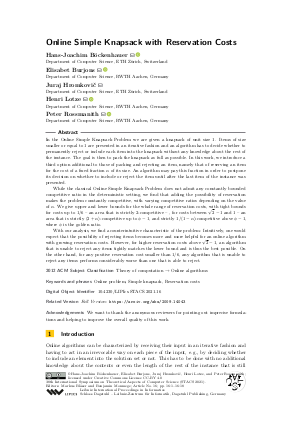@InProceedings{bockenhauer_et_al:LIPIcs.STACS.2021.16,
author = {B\"{o}ckenhauer, Hans-Joachim and Burjons, Elisabet and Hromkovi\v{c}, Juraj and Lotze, Henri and Rossmanith, Peter},
title = {{Online Simple Knapsack with Reservation Costs}},
booktitle = {38th International Symposium on Theoretical Aspects of Computer Science (STACS 2021)},
pages = {16:1--16:18},
series = {Leibniz International Proceedings in Informatics (LIPIcs)},
ISBN = {978-3-95977-180-1},
ISSN = {1868-8969},
year = {2021},
volume = {187},
editor = {Bl\"{a}ser, Markus and Monmege, Benjamin},
publisher = {Schloss Dagstuhl -- Leibniz-Zentrum f{\"u}r Informatik},
address = {Dagstuhl, Germany},
URL = {https://drops.dagstuhl.de/entities/document/10.4230/LIPIcs.STACS.2021.16},
URN = {urn:nbn:de:0030-drops-136613},
doi = {10.4230/LIPIcs.STACS.2021.16},
annote = {Keywords: Online problem, Simple knapsack, Reservation costs}
}

 Creative Commons Attribution 4.0 International license
Creative Commons Attribution 4.0 International license

